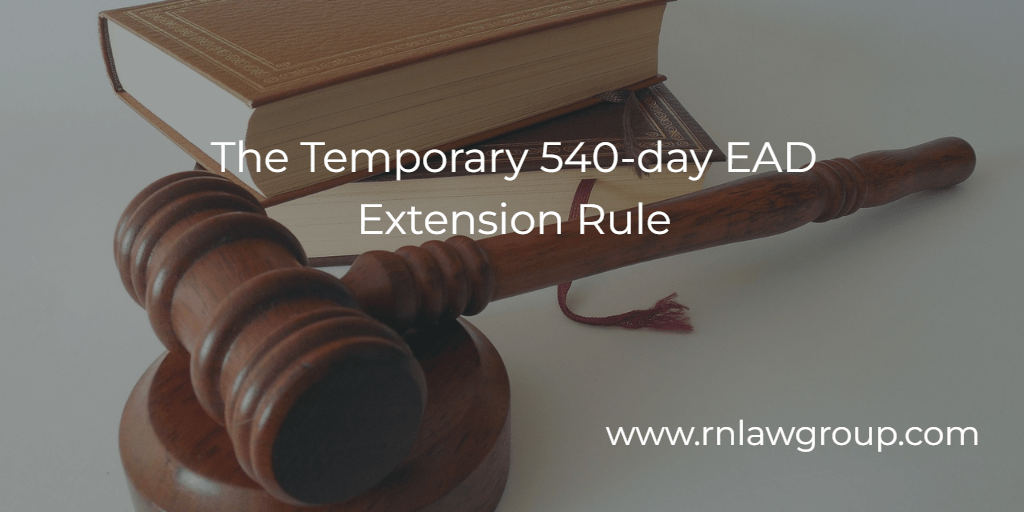
The Temporary 540-day EAD Extension Rule
An Employment Authorization Document (EAD) is a work permit issued to individuals in many different immigration categories. If you receive an EAD, it may be used to prove to an employer that you are legally authorized to work in the United States. If you are eligible for an EAD, you may submit an application on Form I-765, with photos and fees, if required.
As long as you remain eligible for an EAD, you may apply to renew the EAD before it expires. United States Citizenship and Immigration Services (USCIS) has previously granted an automatic 180-day extension to work authorization while an EAD renewal application is pending for certain applicants.
You may be eligible for an automatic extension of work authorization if:
1) You timely filed your Form I-765 before the date that your current EAD has expired or within the applicable filing period for TPS applicants.
2) You are applying to renew your EAD in the same category as your previous EAD. (There is an exception for Temporary Protected Status (TPS) beneficiaries or pending applicants: their EAD and renewal application must contain either the A12 or C19 category, but the categories do not have to match each other.)
3) Your eligibility for employment authorization is NOT dependent on the adjudication of another benefit.
Now, due to historically long processing times, USCIS has temporarily increased the automatic extension period for up to 540 days, while an EAD renewal application is pending. The change was formalized through a Temporary Final Rule, which will remain in place through October 26, 2023. After October 26, 2023, USCIS has indicated that it will revert to 180-day automatic extensions.
To receive the automatic extension of up to 540 days, you must timely file an EAD renewal application in an eligible category (see below) by October 27, 2023.
Finally, if your EAD renewal application is denied, then the automatic extension of work authorization may end before the 540-day period.
Am I eligible for the additional extension to work authorization?
Yes, if you:
- Timely filed your EAD renewal application before May 4, 2022, and your previous 180 day auto-extension has expired.
- Then, you receive an additional 360 days of work authorization.
- Timely filed your EAD renewal application before May 4, 2022, and the original 180-day extension has not yet expired.
- Then, you receive the remainder of the 180- day extension, plus an additional 360 days of work authorization.
- Have timely filed or will timely file your EAD renewal application between May 4, 2022, and October 26, 2023.
- Then, you receive a 180-day extension, plus 360 days extension, for a total of 540 days of extended work authorization.
As proof of your employment authorization, you will present your expired or expiring EAD and the Form I-797C receipt notice that USCIS sent you after you filed your EAD renewal application. Your employer is required to verify or reverify your employment authorization and record the details of the documents that you present on Form I-9.
If you or your employer are confused about when your work authorization extension will now expire, you’re not alone! USCIS has created an online tool to assist you and your employer in calculating your work authorization extension date: https://www.uscis.gov/i-9-central/form-i-9-resources/ employment-authorization-document-read-automatic-extension- calculator.
Finally, if your EAD renewal application is denied, then the automatic extension of work authorization may end before the 540-day period.
The EAD categories eligible for the 540-day automatic extension to work authorization (as indicated on Form I-765 under “Class Requested” at the time of the EAD renewal application) are:
(a)(3) Refugee
(a)(5) Asylee
(a)(7) N-8 or N-9
(a)(8) Citizen of Micronesia, Marshall Islands, or Palau
(a)(10) Withholding of Deportation or Removal Granted
(a)(12) Temporary Protected Status (TPS) Granted
(a)(17) Spouse of principal E nonimmigrant with an unexpired I-94 showing E nonimmigrant status
(a)(18) Spouse of principal L-1 Nonimmigrant with an unexpired I-94 showing L-2 nonimmigrant status
(c)(8) Asylum Application Pending
(c)(9) Pending Adjustment of Status under Section 245 of the Act
(c)(10) Suspension of Deportation Applicants (filed before April 1, 1997)
Cancellation of Removal Applicants
Special Rule Cancellation of Removal Applicants Under NACARA
(c)(16) Creation of Record (Adjustment Based on Continuous Residence Since January 1, 1972)
(c)(19) Pending initial application for TPS where USCIS determines applicant is prima facie eligible for TPS and can receive an EAD as a “temporary treatment benefit”.
(c)(20) Section 210 Legalization (pending I-700)
(c)(22) Section 245A Legalization (pending I-687)
(c)(24) LIFE Legalization
(c)(26) Spouses of certain H-1B principal nonimmigrants with an unexpired I-94 showing H-4 nonimmigrant status
(c)(31) VAWA Self-Petitioners
It is important to note that H-4 EAD renewal applicants are only eligible for the automatic extension if their I-94 for H-4 status extends beyond the validity of the current EAD card. If the H-4 status has not yet been extended, the applicant is not eligible to continue working based on a timely filed renewal. However, there may be a solution, see https://www.youtube.com/watch?v=Zw8EtT5dBWY. Before traveling to obtain an extended I-94, we recommend consulting with a qualified immigration attorney for your specific situation.
By: Emily Neumann, Managing Partner
Emily Neumann is Managing Partner at Reddy Neumann Brown PC with over 15 years of experience practicing US immigration law providing services to U.S. businesses and multinational corporations. Emily has helped transform the firm from a solo practice to Houston’s largest immigration law firm focused exclusively on U.S. employment-based immigration. She received her Bachelor’s degree in Biology from Central Michigan University and her Juris Doctorate degree from the University of Houston Law Center. Emily has been quoted in Bloomberg Law, U.S. News & World Report, Inside Higher Ed, and The Times of India on various hot topics in immigration. She is a member of the American Immigration Lawyers Association and Society for Human Resource Management.
In today’s global economy, being able to navigate the imm

